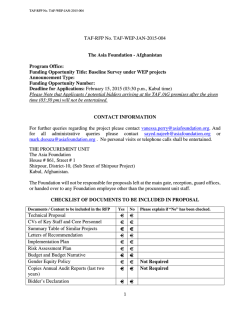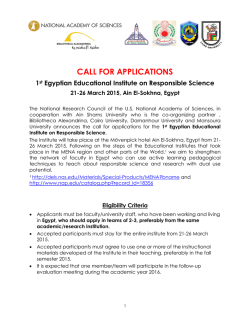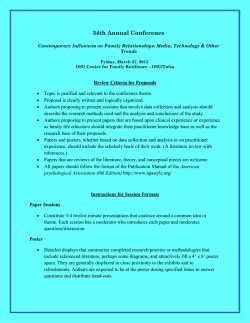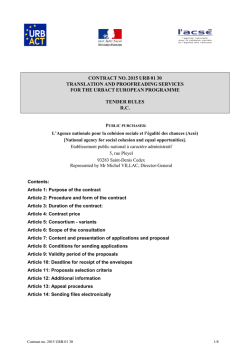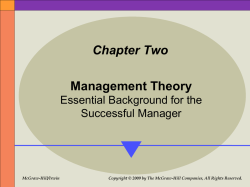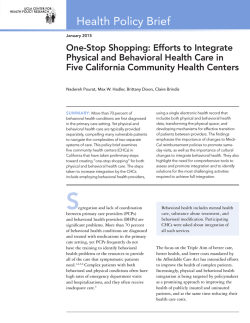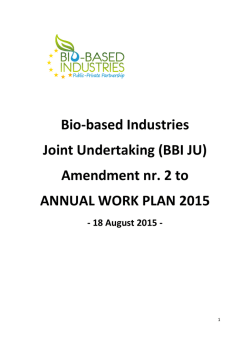
Request for Proposals- Community Placement Plan FY 2014-2015
REQUEST FOR PROPOSALS FY 2014-15 Community Placement Plan Date: To: From: RE: February 2, 2015 Interested Individuals and Organizations Regional Center of the East Bay Request for Proposals Regional Center of the East Bay is a private non-profit organization under contract with the California Department of Developmental Services. RCEB is part of a statewide network of 21 Regional Centers responsible for the coordination and development of services to meet the needs of people with developmental disabilities in Alameda and Contra Costa Counties. RCEB has identified a need for resources to serve individuals who are currently residing in State Developmental Centers (DC) or who are at risk of entering a facility for acute crisis stabilization. This need is outlined on pages 5 and 6, along with the corresponding start-up funds which are available for each project. PLEASE NOTE: Start-up funds are meant to supplement the costs involved with developing the project. It is expected that the applicant will have sufficient funds to contribute to the development of the project as well. Also, applicant must have sufficient funds to endure the transition time, when the program is not full. For the homes, this process could take up to a year. For the day program, it will likely take longer to reach full census and there will be an expectation that some spaces may be held for consumers that will be moving out of Sonoma Developmental Center (i.e. individuals moving into the home projects identified in this Request for Proposals). Innovative, person-centered service delivery models are encouraged. RCEB is seeking state-of-the-art, model programs for the identified projects. Program descriptions should reflect innovative, cost effective services, which emphasize staff training, exceptional consumer services, and excellent quality improvement practices. The awardees will work closely with the Interdisciplinary Teams (ID Teams) while developing the services, prior to admission and thereafter. RCEB reserves the right of final approval prior to any consumer admission. Date of admission is determined by the ID Teams. Please note that per Senate Bill 74, there is a requirement that any service provider receiving funds through a negotiated rate can not allocate more than 15% of received revenue towards administrative costs. Also, service providers receiving more than $250,000 in revenue from a regional center are required to conduct an independent financial review. If the service provider receives more than $500,000 in revenue from a regional center, they are required to conduct an independent financial audit. This requirement is to be funded by the service provider. Please refer to SB 74 for more information. A link to this is on the RCEB website, www.rceb.org. -1- Proposal Instructions and Submission Format: Deliver proposals to the Regional Center of the East Bay, Attn: Marc Sugars at 500 Davis St., Suite 100, San Leandro, CA 94577 by 5 PM on Monday, March 2, 2015. Documentation: 8 (eight) copies of your proposal, fastened with a binder clip. Please do not staple any of the pages, please do not use folders. Proposals must be written in 12-point font, Times New Roman or Arial, double-spaced on white 8 ½ x 11 inch paper, single-sided. All pages should include an identifying footer with agency name, project number, and numbered pages. We look forward to receiving your proposals. All additional inquiries regarding the application or requesting technical assistance should be directed to Marc Sugars, Senior Resource Specialist at (510) 618-6485/e-mail at [email protected]. You may also contact Steve Robinson, CPP/SDC Supervisor at (510) 618-7747/ email at [email protected]. Please do not call for application status. Please submit 8 (eight) single-sided copies of the following (in the order listed below): 1. RFP Application Form (Attachment A). 2. A statement indicating the author of the proposal. 3. An Idea Statement. This is an opportunity to present a program proposal unique to your particular interests and experience. The Idea Statement must include: (Use appropriate section headers) Thirteen to Sixteen (13 to 16) page Idea Statement addressing the following: a. A brief description of your philosophy, values, exceptional, and innovative service approaches toward providing the indicated service for the targeted group of consumers (1 page) b. Please read the vignette related to the project to which you are applying. These vignettes are not meant to be comprehensive in the description of the consumer. What other information about the consumer do you feel would be important to know? Please describe how you would assess the consumer in the vignette, including any tools that you might use. Who would you try to contact to get information as part of the assessment of the individual? How will you determine which specialized services might benefit the consumer? Please include a list of any possible specialized services that you think could be of benefit to the consumer in the vignette based on the information provided. (3-5 pages) c. Describe your intervention process should a consumer who lives in the home or goes to the day program become unstable and poses a challenge for the services you provide. (1 page) -2- d. A sample one-week’s consumer program schedule that identifies day activities and community integration activities (up to 1 page) e. A one-week schedule that shows proposed staffing pattern that includes the number and distribution of hours for licensed (if applicable) and unlicensed staff and other support personnel (1 page) f. An organizational chart demonstrating the various programs your organization operates and how this proposed project would fit into this chart (1-2 pages) g. An organizational chart that identifies lead and supervisory personnel (up to 1 page) h. A description of the staff training program for at least a 12 month period (up to 1 page) with emphasis on topics related to the type of consumers that you will be serving. i. A description of your plan for evaluating program services and your plan for quality improvement. (1 page) j. Please note that you are expected to be able to serve consumers from all ethnic and cultural backgrounds and be able to support the individual in his or her primary language. Please include a brief description related to your abilities to do this. (up to 1 page) k. Specific time lines for completion of this project that covers all major steps in the process leading up to the targeted opening date of services (1 page) 4. A line item On-going Monthly Budget that indicates the anticipated operating costs of your new program (Attachment B). Please be aware that trailer bill SB 74 states that up to 15% of revenue received by RCEB can go towards administrative costs. Please see trailer bill for more information. Please note that, if selected for this project, a more comprehensive, detailed tool will be used. 5. A description of fiscal stability using the attached Financial Statement (Attachment C). (You may be required to provide proof of financial responsibility prior to signing a contract for start-up funds). 6. The names, addresses and phone numbers of three Professional References and at least one professional letter of reference describing your abilities and qualifications in regards to this proposal (Attachment D). 7. A list of proposed Program Consultants, salary paid and estimated hours per month for start-up and on-going consultation (Attachment E). 8. A proposed Start-Up Budget defining how the funds will be used (Attachment F). Please note that there is an expectation that applicant will contribute in-kind funds during the start- -3- up phase. Please indicate these in-kind funds on this document. Also, applicant must have ability to be financially solvent during the transition period (i.e. time between the day that the home opens and the day that all consumers have moved in). RCEB will not be able to reimburse provider for vacant beds. 9. Resume demonstrating evidence of applicant’s qualifications such as: education, experience, and skills demonstrated in working with people with developmental disabilities (at least one year of providing direct supervision and special services to people with developmental disabilities) and those with mental health, behavioral, and health issues. **THE APPLICATION PACKET MUST BE COMPLETE FOR CONSIDERATION AND MUST CONFORM TO PAGE RESTRICTIONS. PROPOSALS THAT EXCEED THE INDICATED PAGE SINGLE-SIDE LIMIT WILL NOT BE CONSIDERED. (Page limit is in regards to the Idea Statement and does not include the statement of author of proposal, identified attachments A-F, and Resume)** GENERAL LIMITATIONS: This Request for Proposal does not commit Regional Center of the East Bay to award a contract, to pay any cost incurred in the preparation of the proposal, to contract in response to this request, or to procure or contract for services or supplies. To be considered, proposals must be received at the Regional Center of the East Bay by the closing date and time indicated. EVALUATION PROCESS: A. A Contact Person is identified with this project and will provide limited technical assistance with the RFP process as appropriate. B. Applicants must submit 8 (eight) single-sided copies of their proposal. C. The Contact Person reviews proposals for level of completion and notifies all applicants in writing if their proposals were complete and accepted or if their proposals were incomplete or failed to meet minimum requirements. D. All complete proposals will be evaluated through an Evaluation Committee review process. The Evaluation Committee may include such members as those who are RCEB staff, Area Board V staff, Developmental Disabilities Council staff, state developmental center staff, and consumers. E. Contact Person notifies each applicant in writing of the Evaluation Committee’s decision. In the event that no proposal is selected, Regional Center of the East Bay may complete the RFP process without assigning an applicant to the project. The final decision made -4- by the Evaluation Committee is not subject to appeal. Materials submitted by applicants will be held on file for a period of three years at the Regional Center of the East Bay. RCEB Timeline 1. 2. 3. 4. Monday, February 2, 2015: RFP is announced and disbursed Monday March 2, 2015: 5 PM: Proposals are due at RCEB March 3, 2014 through May 31, 2015: Evaluation Committee Process Week of June 1, 2015: Written correspondence is sent to all applicants informing them of the start-up award decisions. PROJECT DESCRIPTION: Project #1: One (1) Four Bed Specialized Residential Facility for Elders with Specialized Health Conditions and Behavioral Needs Regional Center of the East Bay has identified a need for a 4 bed residential care facility for the elderly (RCFE) serving individuals who are experiencing both behavioral and health challenges. The individuals served will likely be transitioning from Sonoma Developmental Center. The provider must be able to provide an enhanced staffing ratio and will be expected to consult with both a behaviorist and a registered nurse as well as other appropriate consultants. Possible behavioral issues that might be experienced are institutionalized behaviors such as hoarding, screaming or loud vocalizations, self injurious behavior, minor property destruction, and physical aggression. Possible health issues might include the need for gastrostomy tube feedings/supplements, constipation, uncontrolled seizure disorders, diabetes, cardiovascular issues, insulin dependent diabetes, oral feeding issues such as dysphagia, and hearing and vision impairments. In addition to regular use of a nursing consultant, the home should be staffed by a licensed nurse at a minimum of 40 hours per week. Consumers might require total care assistance for their activities of daily living and self care needs. This home should be a nonambulatory home. The provider will ensure that non-licensed direct care staff members are trained in all behavior and health issues necessary to serving the consumers safely in the home. Start Up Funding: On-Going Rate: $185,000 to be negotiated -5- Project #2: One (1) Day Program for Consumers who have Specialized Health Conditions and Behavioral Needs Regional Center of the East Bay has identified the need for a day program to serve consumers that experience both specialized health conditions and behavioral needs. This program will likely serve a limited number of people (maximum of 20). Some consumers will likely be moving from Sonoma Developmental Center; others will be consumers currently living in the community. Possible behavioral issues that might be experienced are institutionalized behaviors such as hoarding, screaming or loud vocalizations, self injurious behavior, minor property destruction, and physical aggression. Possible health issues might include the need for gastrostomy tube feedings/supplements, constipation, uncontrolled seizure disorders, diabetes, cardiovascular issues, insulin dependent diabetes, oral feeding issues such as dysphagia, and hearing and vision impairments. In addition to regular use of a nursing consultant and behavioral consultant, the program should be staffed by a licensed nurse at all times. Other consultants might be utilized if deemed appropriate for the consumers served. Provider must be able to provide an enhanced staffing ratio. Consumers might require total care assistance for their activities of daily living and self care needs. This program should be licensed for as many nonambulatory consumers as Community Care Licensing will allow. Therefore, an appropriate facility will need to be located. The provider will ensure that non-licensed direct care staff members are trained in all behavior and health issues necessary to serving the consumers safely at the program. It is suggested that applicant be familiar with the latest building codes regarding renovations of a day program facility so as to be aware of the possible financial costs involved with this. Start Up Funding: On-Going Rate: $ 200,000 to be negotiated Project # 3: One (1) Four Bed Specialized Residential Facility for Children with Significant Behavioral and/or Mental Health Challenges. Regional Center of the East Bay has identified a need for a 4 bed specialized residential facility to serve children with autism and/or who have a need for intensive behavioral supports. Some consumers might also have a mental health diagnosis. The individuals served will be aged 1118. Due to the intensive needs of the individual, more support is needed than what can be provided in the ARM Level system. Provider must be able to provide an enhanced staffing ratio and will be expected to consult with a behaviorist and other needed consultants. Examples of the behavioral issues that might be encountered are physical aggression towards peers and staff, property destruction, elopement, PICA, and self injurious behavior. It is possible that these behaviors would occur frequently and could be on the severe end of the spectrum. Staff should have experience working with individuals who have autism. The home should have the ability to accommodate at least two non-ambulatory consumers. Start-Up Funding: $185,000 On-Going Rate: to be negotiated -6- ------------------------------------------------------------------------------------------------------------ VIGNETTES: For Project #1 Paul is a 71 year old man with a diagnosis of profound intellectual disability with mild cerebral palsy with spastic quadriplegia, and bipolar disorder. He can hear in his right ear only and can see in his left eye only. He lives at a state developmental center. He mainly communicates using gestures, pointing, eye gaze, leading staff, and his willingness to cooperate. His receptive skills are good and he is able to follow simple directions. Staff tend to complement verbal speech with ASL. Paul has an awkward gait but is able to ambulate independently. Among his medical conditions are hypothyroidism, anemia, hypertension, cardiomegaly/P7-2 Sinaotrial node dysfunction (sick sinus syndrome), using a cardiac pacemaker, high risk for constipation due to dysphagia and medications, and Benign Prostatic Hypertrophy. Behavioral issues include SIB, aggression towards others, and property destruction. He has a history of chewing grass and leaves, although it is reported that he does not ingest these items. He also will sometimes take off his clothing in public after returning from day program. It is reported that he needs supervision with eating, toileting. He needs limited assistance for dressing, more involved assistance for grooming, and total assistance for bathing. For Project #2 George is a 51 year old man currently living at a state developmental center. He has a diagnosis of severe intellectual disability, atypical depression disorder, and epilepsy. He has vision loss in his left eye, has an abnormal gait, and has significant gastrotestinal issues. George mainly communicates by saying yes or no and by saying the word “Aashee”, which appears to have a diversity of meanings. Due to his abnormal gait, he is at high risk for falls and fractures. He sometimes uses a wheelchair. Other health/nursing issues include experiences of wheezing, acute gastritis with corkscrew esophagus, and the implantation of a vegal nerve stimulator this past year. His main behavioral concern is aggression, which might come in the form of hitting, kicking, or pushing. -7- Often, he is cooperative in working on his Activities of Daily Living goals, especially if he is being supported by a preferred staff member. At his day program, it is reported that amongst George’s favorite activities are taking labels off of cans and working on jigsaw puzzles. He tends to be able to stay focused on the task at hand. It is reported that George loves to associate with a wide range of people when he is in a good mood. But he also values alone time as well. He likes to experience a variety of activities and is able to make his choices known. For Project #3 John is 13 years old and has a diagnosis of autism. He lives with his mother and his grandmother. Respite services are currently being utilized. However, the family believes that John needs more support than they can provide so a group home is being considered. According to John’s mother, he typically does not seem to like being with others, accept for a few adults. He does not maintain or form friendships. According to the mother, John does seem to do better out in the community when he is with his class at school. It is reported that John enjoys video games, watching TV, videos, swinging, finger songs, being in the backyard, jumping on the trampoline and instrumental music. He also enjoys the computer, movies and riding in the car. His mother reports that riding in the car appears to calm him. John engages in serious self-injurious behavior by head banging at home and at school, he head butts. His mother reports that he will rip the skin off of his feet. Other behaviors include serious physical aggression, property destruction, and biting others, fecal smearing, and bolting. He will bolt at any opportunity and has learned how to undo all the locks in the house. He does not appear to have safety awareness skills. John displays repetitive body movements in the form of kicking his feet and flapping his hands. He needs to be supervised at all times. John receives speech-language and occupational therapy services at a specialized behavioral school. He also has a 1:1 aide. He uses a multi-modality approach to communication (sign/gesture, vocalizations, body language, and facial expressions, leading). He does not say sentences. He is currently using an iPad as a form of communication. -8-
© Copyright 2026
